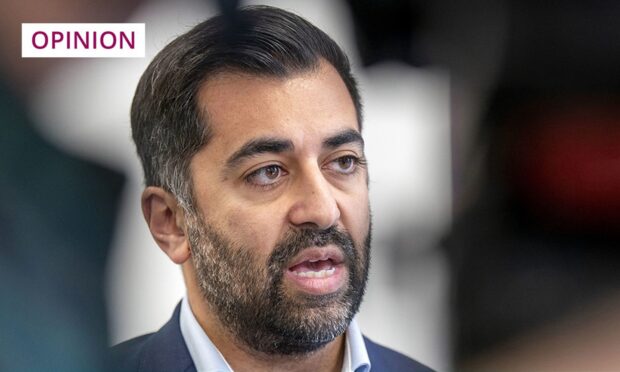Last week, Humza Yousaf called on Westminster to welcome Palestinian refugees to the United Kingdom, highlighting that “in the past, people in Scotland and across the U.K. have opened our hearts and our homes and welcomed those from Syria, Ukraine and many other countries”.
Yousaf told his party conference: “There are currently around one million people displaced within the Gaza Strip.
“I am therefore today calling on the international community to commit to a worldwide refugee program for the people of Gaza.”
We’ve all been following the horrific news from Gaza, but it is heartbreakingly personal for the Scottish first minister, as his parents-in-law are currently trapped in Gaza, having arrived in the country to visit family prior to October 7.
Yousaf went on to say of the UK government: “Firstly, they should immediately begin work on the creation of a refugee resettlement scheme for those in Gaza who want to, and are able to, leave.
And when they do so, Scotland is willing to be the first country in the U.K. to offer safety and sanctuary to those caught up in these terrible attacks.”
Since 2014, Scotland has welcomed thousands of refugees from Syria, Afghanistan and Ukraine, but just 259 refugees were resettled in Scotland through the UK Government Resettlement Scheme during 2020 and 2021, with half of those coming in the first quarter of 2020 – before Covid-19 lockdowns began.
In 2023, the picture remains worrying as the supposed flagship scheme set up by the Home Office to bring civilian Afghan refugees to the UK has only just commenced.
The first group of Afghan nationals arrived on a flight from Pakistan this week.
According to a 2021 poll conducted by the Scottish Refugee Council, the general mood in Scotland chimes with Yousaf’s words. As a nation, we are mainly positive and welcoming.
77% of people agreed that “people seeking refugee status should have the right to work to support themselves and their families” and 64% of people thought that Scotland should welcome the same number or more refugees than it does now.
Most people polled think that people seeking asylum should be housed in accommodation within local communities, not in what is optimistically termed ‘institutional accommodation’, i.e., that, like the Bibby barge, which is cruelly unfit for purpose.
New Scots
Immigration and asylum are reserved matters, decided upon by Westminster.
However, the Scottish Government, using its devolved powers, supports asylum seekers and refugees in Scotland, as set out in the New Scots refugee integration strategy (2018-2022).
The strategy commits to improved access to services such as education, housing, health and employment. It aims to help people settle and become part of the community.
Around 3,000 people were resettled in council areas across Scotland through the Syrian Vulnerable Persons Resettlement Scheme.
The scheme opened in January 2014 and closed in February this year. Ten Syrian families resettled in the Western Isles as a result.
In response to the closure of the scheme, the Communities for Refugees Western Isles has been set up to help those fleeing the war to find a safe home and rebuild their lives.
Volunteers and agency representatives involved in that initiative, which began with the arrival of the first Syrian families in Stornoway in spring 2016, are among those forming a new island-based group.
Some of the settled Syrian families are also now helping to support families from Afghanistan, brought to Lewis as part of the mass evacuation.
A number of Syrian families have been resettled by Highland Council across Inverness, Dingwall, Kinlochleven and Alness since 2015.
Several of the group took part in a photography project, Highlighting Highlands, after lockdown.
This Document Scotland and Highland Migrant and Refugee Advocacy project captured refugees’ experiences of their new life in the Highlands.
Free bus travel
We did hear some good news this week: all people seeking asylum in Scotland are to be given free bus travel, under a new £2million-a–year plan announced by minister Patrick Harvie.
This initiative came from a cross-party campaign and will support around 5,000 people.
The money had been earmarked within the Scottish budget for 2024/25.
It will give the opportunity to travel throughout Scotland, whether in Aberdeen, Perth, Dunfermline or Dundee, offering an opportunity to travel to college, friends and different services, including legal representation which is tougher to access in the highlands and islands.
Hostile regime
Sadly, this warm Scottish welcome is not reflected in legislation from Westminster.
The UK Government’s anti-refugee bill implemented an even more hostile regime, criminalising people seeking sanctuary and housing people in unsafe, unfit institutional accommodation with little autonomy over their lives.
This is not the desire of the people of Scotland.
We can’t be sure of the future or how many people from Palestine will make the long and difficult journey to seek asylum on our shores.
However, one thing is certain – the hostile UK Government Nationality and Borders Bill does not work for Scotland.
Scottish people have repeatedly shown that we are ready and willing to welcome people fleeing war and persecution.
Our desire for those seeking protection is to build a compassionate and fair system, one that we can be proud of.
The current UK asylum system is a stain on our morality.
Donna McLean is originally from Ayrshire and is a mum of twins, writer and activist.

Conversation